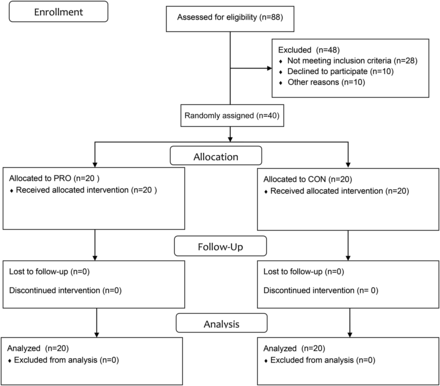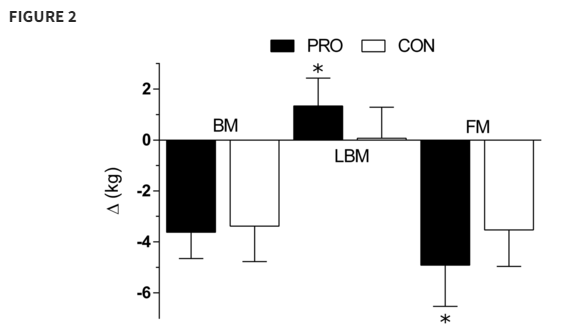BigTex
Well-Known Member
Hypoenergetic diet–induced weight loss results in ∼20–30% of mass lost as lean body mass (LBM), with the remaining mass lost from adipose tissue. So normally you can expect for every 10 pounds of body weight you lost to also lost 2-3 pounds of muscle tissue. However, is there a way to avoid losing this muscle but still cut the fat?
Thomas M Longland, Sara Y Oikawa, Cameron J Mitchell, Michaela C Devries, Stuart M Phillips, Higher compared with lower dietary protein during an energy deficit combined with intense exercise promotes greater lean mass gain and fat mass loss: a randomized trial, The American Journal of Clinical Nutrition, Volume 103, Issue 3, March 2016, Pages 738–746, https://doi.org/10.3945/ajcn.115.119339

 academic.oup.com
academic.oup.com
Design: We used a single-blind, randomized, parallel-group prospective trial. During a 4-wk period, we provided hypoenergetic (∼40% reduction compared with requirements) diets providing 33 ± 1 kcal/kg LBM to young men who were randomly assigned (n = 20/group) to consume either a lower-protein (1.2 g · kg−1 · d−1) control diet (CON) or a higher-protein (2.4 g · kg−1 · d−1) diet (PRO). All subjects performed resistance exercise training combined with high-intensity interval training for 6 d/wk. A 4-compartment model assessment of body composition was made pre- and postintervention.
The protein amount come out to about 0.54g/lb and 0.93g/lb They also did a combination of weight training and HIIT 6 days a week. All subjects were untrained. Participants were provided with all meals and beverages to consume throughout the intervention period (with the exception of water and noncaloric drinks, which were ad libitum).
Conclusions: Our results showed that, during a marked energy deficit, consumption of a diet containing 2.4 g protein · kg−1 · d−1 was more effective than consumption of a diet containing 1.2 g protein · kg−1 · d−1 in promoting increases in LBM and losses of fat mass when combined with a high volume of resistance and anaerobic exercise. Changes in serum cortisol were associated with changes in body fat and LBM, but did not explain much variance in either measure.
In the current study, the loss of fat mass was the sole contributor to the participants’ weight loss.
Very interesting results. We know increasing protein in a restricted diet helped prevent muscle mass losses but now we see it may prevent muscled losses all together. So it seems to be very possible to lose fat and gain muscle at the same time.
Thomas M Longland, Sara Y Oikawa, Cameron J Mitchell, Michaela C Devries, Stuart M Phillips, Higher compared with lower dietary protein during an energy deficit combined with intense exercise promotes greater lean mass gain and fat mass loss: a randomized trial, The American Journal of Clinical Nutrition, Volume 103, Issue 3, March 2016, Pages 738–746, https://doi.org/10.3945/ajcn.115.119339

Higher compared with lower dietary protein during an energy deficit combined with intense exercise promotes greater lean mass gain and fat mass loss: a randomized trial
ABSTRACT. Background: A dietary protein intake higher than the Recommended Dietary Allowance during an energy deficit helps to preserve lean body mass (LBM), pa
Design: We used a single-blind, randomized, parallel-group prospective trial. During a 4-wk period, we provided hypoenergetic (∼40% reduction compared with requirements) diets providing 33 ± 1 kcal/kg LBM to young men who were randomly assigned (n = 20/group) to consume either a lower-protein (1.2 g · kg−1 · d−1) control diet (CON) or a higher-protein (2.4 g · kg−1 · d−1) diet (PRO). All subjects performed resistance exercise training combined with high-intensity interval training for 6 d/wk. A 4-compartment model assessment of body composition was made pre- and postintervention.
The protein amount come out to about 0.54g/lb and 0.93g/lb They also did a combination of weight training and HIIT 6 days a week. All subjects were untrained. Participants were provided with all meals and beverages to consume throughout the intervention period (with the exception of water and noncaloric drinks, which were ad libitum).
Conclusions: Our results showed that, during a marked energy deficit, consumption of a diet containing 2.4 g protein · kg−1 · d−1 was more effective than consumption of a diet containing 1.2 g protein · kg−1 · d−1 in promoting increases in LBM and losses of fat mass when combined with a high volume of resistance and anaerobic exercise. Changes in serum cortisol were associated with changes in body fat and LBM, but did not explain much variance in either measure.
In the current study, the loss of fat mass was the sole contributor to the participants’ weight loss.
Very interesting results. We know increasing protein in a restricted diet helped prevent muscle mass losses but now we see it may prevent muscled losses all together. So it seems to be very possible to lose fat and gain muscle at the same time.






















